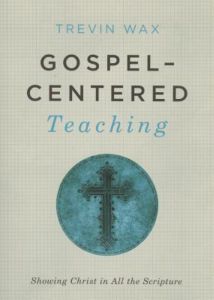About the Author
Trevin Wax is managing editor of The Gospel Project at LifeWay Christian Resources.
Reviewed by John T. Jeffery
This small and very readable work may be considered as an entry level introduction to an issue addressed by many other authors in much larger and more technical volumes. Several of these are listed by Wax (pp. 62-63).
The author exhibits a gracious manner throughout. This appears especially in the first chapter, “Something’s Missing” (pp. 1-18) where he mentions other solutions, techniques and ideas that fail to get at the root of the problem Wax is addressing in the book. He does not lightly dismiss these emphases or trends, nor does he reject them out of hand. He is very realistic, and admits that he doesn’t “think there is a silver bullet to accomplishing discipleship through small groups.” (pg. 6). In this chapter he also makes clear both what the book is about, and just as importantly, what it is not about. This understanding, realism and graciousness is also quite evident in the second chapter, “Back to Basics” (pp. 19-43), where he addresses various definitions of the Gospel (pp. 35-39).
Some of his statements are attention arousing quotes worth repeating. Examples from the first chapter are:
- His analyses of the Biblical literacy problem, “It’s an epidemic”. (pg. 12)
- “The last thing we want is a closed-off group of biblical junkies who view Bible study as their “fix” for the week.” (pg. 13)
- “At the end of the day, we’ve got people who can win a game of Bible trivia, but who don’t look very much like Jesus.” (pg. 13)
- “But surely we want to go deeper than the demons. They’ve got their theology down (James 2), but are devils still.” (pp. 13-14)
These could easily be added to from the other chapters in the book, which at times resonates with drumbeats reminding one of similar teachings from John Piper or Jerry Bridges.
By the time the reader engages the presentation of his three answers to the most difficult “why” question, “Why Gospel-Centered?” in the second chapter (pp. 25-35) the “make or break” point of the book has been reached. This concludes in the middle of the second longest chapter of the book, and the reader will now either be tracking with the author, and prepared for the defining and applying to follow, or “you probably need to go back to the drawing board” (pg. 41).
Any reader who follows the author’s suggestions in the third chapter, “Connect the Dots and Tell the Story” (pp. 45-74) will undoubtedly agree that doing so is a source of profit and blessing.
One of the strengths of the book are the helpful examples included. This is especially true of the fourth chapter, “Ground Your Application in the Gospel” (pp. 75-94).
The author presents his material in a conversational tone. This may be due to the content being sourced in presentations of The Gospel Project curriculum. In at least one place (last full paragraph, pg. 105) the editing of this conversational tone seems to have overlooked lapses into incomplete sentences. Also, the second sentence in this same paragraph appears to have an error where “gospel-centered truth” should read “gospel-centered teacher”.
The author dedicates this book to “teachers and small group leaders” (pg. ix), and addresses them throughout the book. It seems clear from the contexts where Wax explicitly directs his material to these that the gathered church considered corporately is what he has in mind. Other than such staff members or clergy perhaps there is nothing in what Wax presents in this book that would be inappropriate for others as well. What about parents, especially those who home-school their children, and Christian day-school teachers? This book is just as needed and would be just as beneficial for them as for teachers, preachers, and Bible study group leaders in the gathered church. Wax remarks concerning another book that, “…I’ve been known to give this out to parents with pre-schoolers hoping that the parents would find it as beneficial as the kids” (pg. 60). His own book should be given out to all parents with children “hoping that the parents would find it as beneficial as” the teachers and group leaders in the church. In fact, any Christian involved in evangelism, whether clergy or corporate church staff member or not, would find the content of this book valuable regarding employing the Scriptures in response to questions in everyday encounters with unbelievers. It would be advisable in the interests of a seamless, united effort at Biblical education in both the home and the church, whether gathered or scattered, that this book and others like it be promoted and studied by a much wider audience than the intended focus would suggest.
John T. “Jack” Jeffery is pastor of Wayside Gospel Chapel in Greentown, PA.
